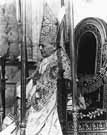
|
|
|

|

|

|

|
|
Click on an image to see a larger, more detailed picture.
|
|
|
|
|
| 1937: Quiet Before the Storm |

|
pg. 112 |

|
|
|
|
| |
|
The concordat gave no comfort to Germany's Jews, for the treaty conferred important international legitimacy on the Third Reich. Indeed, Hitler regarded the concordat as a useful tool to be wielded in the Reich's battle against the Jews. Meanwhile, the Nazis' anti-Catholic pressure did not relent, and by 1937 a mounting list of arrested nuns and priests, closed convents and monasteries, and harassed parochial schools led Pope Pius XI to write "Mit brennender Sorge" ("With Burning Concern"). Issued on March 14, this encyclical protested the Catholic Church's difficulties in Germany, accused the Nazi government of violating its word, and warned against the deification of race, nation, and state. Smuggled into Germany, printed secretly, and distributed to the clergy, it was read from Catholic pulpits throughout the Reich on March 21, Palm Sunday. "Mit brennender Sorge" spoke of "God-given rights" and invoked a "human nature" that went beyond national boundaries. It even stated that rejection of the Old Testament, which some leaders--religious as well as secular--advocated in Nazi Germany, was blasphemous. Yet, failing to mention the racist Nuremberg Laws that had stripped civil rights from Germany's Jews in 1935, it offered no condemnation of the persecution of German Jews. Instead of protesting antisemitism, in fact, "Mit brennender Sorge" referred to the Chosen people as those who were "constantly straying" from God and who had crucified Christ. Pius XI's pronouncements sent mixed signals about the "Jewish question," but he became an increasingly strong critic of the Nazi state. In June 1938 he summoned Father John LaFarge, an American Jesuit priest, to confer with him. Impressed by LaFarge's antiracist work in the United States, Pius XI went outside the usual Vatican personnel and assigned LaFarge to draft "Humani Generis Unitas" ("The Unity of Humankind"), an encyclical that would denounce racism and the persecution of Jews by advocates of racial purity. As the fate of German and Austrian Jews worsened under the Nazi grip, LaFarge and a few trusted colleagues worked in Paris, writing and revising a text that grew to almost 100 pages. A heart attack took the life of Pius XI during the night of February 9, 1939. LaFarge's draft of "Humani Generis Unitas" was reportedly on the Pope's desk at that time. Delayed for several months by the Vatican's bureaucracy, it had reached the Pope too late to be of consequence. Cardinal Pacelli, who feared Communists more than Nazis, succeeded to the papacy on March 2, taking the name Pius XII. His leadership record during the Holocaust years would be problematic at best. Six months later World War II began. "Humani Generis Unitas" was shelved in Church archives. Nothing much was heard of it until long after the Holocaust took place. Had the encyclical appeared in the 1930s, it alone would not have been sufficient to prevent the Final Solution. One reason is that even as LaFarge's text attacked racism and racially motivated persecution of Jews, it by no means freed itself entirely from traditional anti-Jewish teachings that had been part of Christian tradition for centuries. Nevertheless, the disappearance of "Humani Generis Unitas" stands out as a significant example of lost opportunities that might have helped Jews by bringing international pressure to bear on the Nazi state.
|
 Pope Pius XI's encyclical "With Burning Concern" protested Nazi attacks on the Church.
Pope Pius XI's encyclical "With Burning Concern" protested Nazi attacks on the Church.
Photo: AP/Wide World Photos
|
|

|

|

|
|
|
|
|
| 1937: Quiet Before the Storm |

|
pg. 112 |

|
|
The Holocaust Chronicle
© 2009 Publications International, Ltd.
|
|
